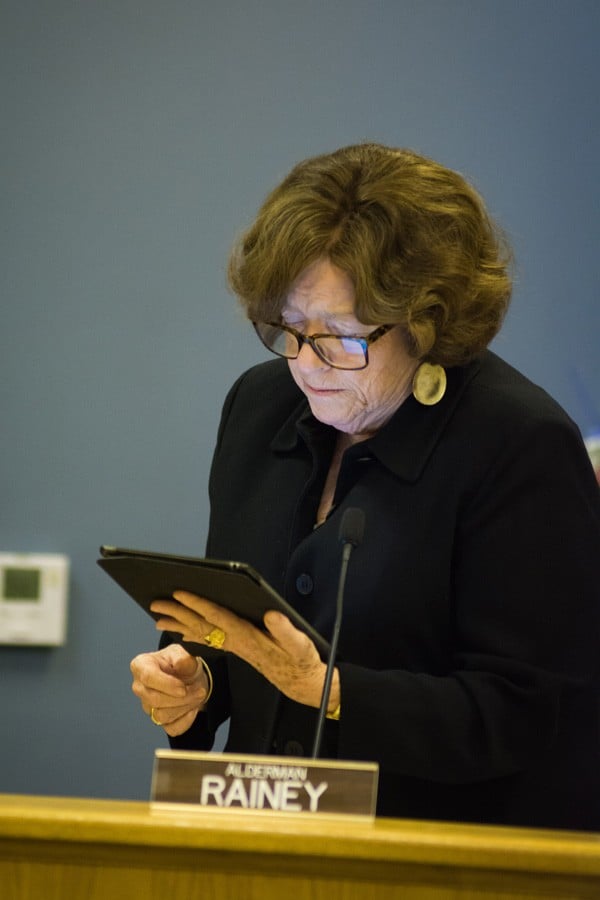Landlords say new housing ordinance proposals will not create safer community
Daily file photo by Daniel Tian
Ald. Ann Rainey (8th) attends a City Council meeting. Rainey and two other city officials hosted a meeting discussing two ordinances that were introduced about problems in Evanston rental housing.
March 3, 2016
While city officials try to increase accountability and decrease crime in Evanston housing through two new ordinances presented to City Council, local landlords said the measures unfairly punish landowners for the crimes of their tenants.
On Feb. 22, city staff introduced the Neighborhood Integrity Ordinance and amendments to the Rental Licensing Ordinance to Council. The Neighborhood Integrity Ordinance is meant to provide property owners a method to prevent and deal with violent crimes and nuisances in their buildings. Amendments to the Rental Licensing Ordinance create a citywide grading system for rental properties into two tiers.
Tier I properties satisfy all rental property requirements and have reduced licensing fees. Tier II properties, however, are those in violation of requirements. They are subject to yearly inspections and increased fees, and landlords must take a Neighborhood Integrity and Community Responsiveness Training course.
Ald. Ann Rainey (8th) hosted an event Wednesday night at the former Evanston Police Department Outpost, 633 Howard St., where landlords in the 8th Ward and beyond discussed the ordinances. More than 35 landlords and community members attended the meeting, led by Rainey and two other city officials. Rainey said she is “not on board” with the ordinances, and wanted to hear from local landlords on how to effectively address community problems.
“Certain alderman have pushed the Neighborhood Integrity Ordinance, but I’m just not sure this is the right answer,” Rainey said. “I couldn’t imagine how we would administer it and enforce it.”
Much of the discussion centered on criticisms of the tiered system introduced in the Residential Licensing Ordinance revisions. Landlords feared if their buildings were in or near those classified as Tier II, property values would permanently suffer. Because the properties are sorted based on inspection, landowners also feared they would have to pay increased fees and be forever labeled as a “bad landlord” that attracts more bad tenants.
“I can understand why people would think a Tier II begets Tier II tenants,” Rainey said.
However, it is important to keep in mind that landlord accountability is a pivotal piece in larger affordable housing narratives, said Jes Scheinpflug, director of communications for Open Communities. She said issues of property maintenance and inconsistent housing costs were big issues for poorer tenants in Evanston rental units.
“These issues are present in rental properties throughout the North Shore, but it’s important to understand how these issues are different for people where rent makes up a bigger part of their income,” Scheinpflug told The Daily last week. “The (new Evanston) initiatives are another step to make housing more accessible in the city.”
Landowners at the 8th Ward meeting disagreed, saying the housing ordinances promoted discrimination against minority tenants. Property owner Tina Paden said the provisions discourage good landlords from providing housing in low-income neighborhoods or in Section 8 housing, which places public housing-eligible residents in privately owned buildings, as it puts the burden on the owners to prevent and address crimes in their buildings through the tiered system. Paden said the proposed revisions create a situation where landlords have to work as police in order to not get fined.
“We all want to work with police, but it’s not our role to be deputized and directly stop these crimes out of fear of being punished with fines if you don’t,” Paden said. “If you have problem buildings, the police need to work with the landlords in the building.”
Even considering the problems discussed, the two ordinances address issues that have been consistently brought up to the city, said city manager Wally Bobkiewicz, who co-introduced the ordinances to council. Residential licensing has been brought up three times in the last eight years to council, and in 2012 a citizen task force was launched to address landlord accountability issues, Bobkiewicz said.
“The council knew that something needed to be done,” Bobkiewicz told The Daily last week. “These are issues that really revolve around what is the appropriate role of landlord, what’s the responsibility of a tenant and how state law applies.”
Despite criticizing the new ordinances, landlords said they are willing to work with the city to make more appropriate measures to address the problems discussed without alienating or hurting landlords.
Stuart Garland, a local property owner and developer, said he personally uses crime-free and drug-free policies in his buildings, modeled after Skokie’s Crime-Free Lease Addendum, which is that city’s version of the introduced ordinances. He said he understands the problems the city is trying to address, but it would be more beneficial if they set up more discussions with landlords to make sure the proposed ordinances would effectively create a safer community.
“These problems would get solved a lot easier if the city were cooperative with landlords,” Garland said. “Come to me with a threat of a fine, it’s going to be difficult. But come to me and put your arm around me and say we have a joint problem, and we’ll solve it together.”
Marissa Page contributed reporting.
Email: [email protected]
Twitter: @robinlopsahl


